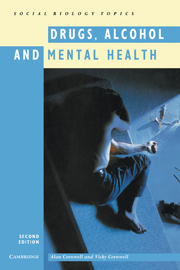Book contents
- Frontmatter
- Contents
- Preface
- 1 Drugs and drug abuse
- 2 Socially acceptable drugs
- 3 Misuse of prescribed and related drugs
- 4 Hallucinogenic drugs
- 5 Opiates and other narcotics
- 6 The biology of alcohol
- 7 The problems of alcohol use
- 8 Prevention and control of alcohol problems
- 9 Help for problem drinkers
- 10 Mental health and mental illness
- 11 Alzheimer's disease and other dementias
- 12 Other mental illnesses
- Further reading
- Index
12 - Other mental illnesses
Published online by Cambridge University Press: 05 June 2012
- Frontmatter
- Contents
- Preface
- 1 Drugs and drug abuse
- 2 Socially acceptable drugs
- 3 Misuse of prescribed and related drugs
- 4 Hallucinogenic drugs
- 5 Opiates and other narcotics
- 6 The biology of alcohol
- 7 The problems of alcohol use
- 8 Prevention and control of alcohol problems
- 9 Help for problem drinkers
- 10 Mental health and mental illness
- 11 Alzheimer's disease and other dementias
- 12 Other mental illnesses
- Further reading
- Index
Summary
Schizophrenia
Although schizophrenia is a well-known mental illness and has been subject to much research, its causation is still uncertain. It is recognised only by its symptoms and the way in which it alters behaviour and functioning. The term schizophrenia means ‘split mind’. This does not imply split into two distinct parts (Jekyll and Hyde) as is often believed by the layman, but that the mind is fragmented with disconnected thoughts and ideas.
The majority of sufferers develop the illness between the ages of 20 and 40 years. It tends to arise earlier in men than in women. Schizophrenia is a very variable illness which occurs in both acute and chronic forms. There is no single or even constant group of symptoms which are characteristic of the illness but many symptoms, both positive and negative, some of which will be present and which together give the diagnosis.
Positive symptoms
These are usually acute symptoms, often with a quite sudden onset. They include disturbances in the control of the patient's thoughts and various delusions and hallucinations. These often lead to restlessness and excitement. A common delusion in schizophrenia is that thoughts or actions are being controlled by an outside force. The hallucinations of schizophrenia are usually auditory ones. They can take the form of believing that one can hear one's thoughts spoken out loud, that one can hear voices talking about oneself (often in uncomplimentary terms) or that voices are commenting on what one is doing.
- Type
- Chapter
- Information
- Drugs, Alcohol and Mental Health , pp. 92 - 100Publisher: Cambridge University PressPrint publication year: 1993



